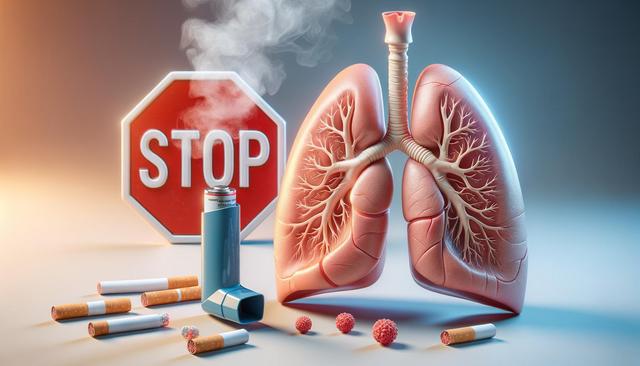Cardiovascular Complications
One of the most serious complications of Chronic Obstructive Pulmonary Disease (COPD) is its impact on the heart. The chronic lack of oxygen and the increased strain on the lungs can put significant pressure on the cardiovascular system. Over time, this can lead to pulmonary hypertension — a condition characterized by increased blood pressure in the arteries of the lungs. This can eventually strain the right side of the heart, a condition known as cor pulmonale. Individuals with COPD are also at greater risk for more common cardiovascular conditions, including heart attacks and arrhythmias.
Some key cardiovascular complications associated with COPD include:
- Pulmonary hypertension
- Right-sided heart failure (cor pulmonale)
- Increased risk of heart attacks and strokes
- Irregular heart rhythms (arrhythmias)
Because the symptoms of heart disease and COPD often overlap—such as shortness of breath and fatigue—diagnosis and treatment can be complex. Regular cardiovascular assessments and careful monitoring are important parts of COPD management.
Respiratory Infections and Exacerbations
Respiratory infections are common in those living with COPD and can significantly worsen symptoms. Viral and bacterial infections, such as the flu or pneumonia, can lead to acute exacerbations—sudden flare-ups of symptoms that may require hospitalization. These exacerbations contribute to lung function decline and can increase the risk of long-term complications or even death.
Common triggers of exacerbations include:
- Seasonal flu
- Bacterial infections like Streptococcus pneumoniae
- Environmental pollutants
- Cold air exposure
Preventative measures such as vaccinations, good hand hygiene, and avoiding crowds during flu season are essential. Timely treatment of infections and the use of bronchodilators or corticosteroids can help manage exacerbations effectively. For those with frequent infections, a doctor may recommend long-term antibiotic therapy as part of a comprehensive care plan.
Lung Function Decline and Respiratory Failure
As COPD progresses, the lungs become less efficient at exchanging oxygen and carbon dioxide. This decline in lung function can eventually lead to chronic respiratory failure, especially in the more advanced stages of the disease. In this state, the lungs are no longer able to provide enough oxygen to the body or remove enough carbon dioxide, which can lead to life-threatening complications.
Symptoms of respiratory failure include:
- Severe breathlessness
- Persistent fatigue
- Confusion or changes in mental alertness
- Blue-tinged lips or fingernails (cyanosis)
Treatment options for respiratory failure may include supplemental oxygen therapy, non-invasive ventilation (such as CPAP or BiPAP machines), and in some cases, mechanical ventilation. Early intervention and regular monitoring of lung function can help delay the onset of respiratory failure and improve quality of life.
Muscle Weakness and Weight Loss
Many people with COPD experience systemic effects that extend beyond the lungs. Chronic inflammation, increased energy expenditure due to labored breathing, and reduced physical activity can all contribute to muscle wasting and unintentional weight loss. This condition, often referred to as cachexia, can further reduce a person’s ability to perform daily tasks and increase their risk of other health issues.
Factors contributing to muscle weakness and weight loss include:
- Decreased appetite
- Difficulty eating due to breathlessness
- Reduced physical activity levels
- Increased metabolic demands
Maintaining proper nutrition and engaging in pulmonary rehabilitation programs that include strength training and aerobic exercise can help manage these systemic effects. Working with a dietitian and a physical therapist can provide personalized strategies to maintain muscle mass and improve overall health.
Mental Health Challenges
The emotional and psychological toll of living with COPD is often underestimated. Many individuals experience depression and anxiety due to the limitations the disease imposes on their daily lives, as well as the fear of exacerbations and the progressive nature of the illness. These mental health challenges can negatively affect treatment adherence and overall health outcomes.
Common mental health concerns among COPD patients include:
- Depression
- Anxiety and panic attacks
- Social isolation
- Sleep disturbances
Integrated care that includes mental health support is vital for comprehensive COPD management. Approaches such as cognitive behavioral therapy (CBT), support groups, and medication can be effective in managing mental health symptoms. Encouraging open communication with healthcare providers can lead to timely interventions and support.
Conclusion
Living with COPD involves more than managing breathing difficulties. The condition can lead to a wide range of complications that affect multiple body systems and overall well-being. Understanding these potential complications—from cardiovascular problems and infections to muscle loss and emotional health—is essential for individuals and caregivers. Through proactive management, regular medical follow-ups, lifestyle adjustments, and emotional support, many of these complications can be mitigated, allowing for a better quality of life despite the challenges COPD may bring.


